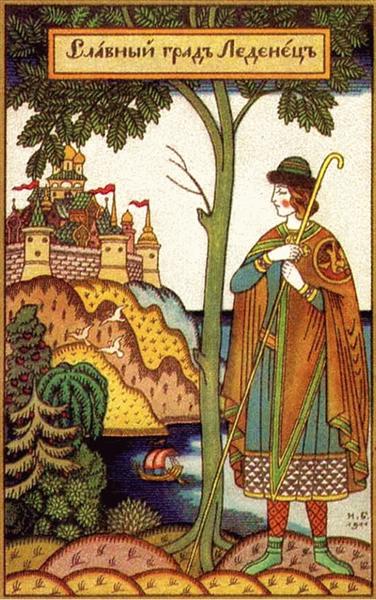Description
To enter the contemplation of "Bonito Castillo de Sweetness" (1911) of Ivan Bilibin is to transport to a world of fantasy and dream, where each element seems to tell its own story. Ivan Bilibin, an eminent Russian painter and illustrator, is known for his skill in capturing the essence of Eslavo folklore, imbueting his works with a sensation of nostalgia and wonder. This painting is no exception; It represents a castle that seems to arise from the sweetest and childish dreams, where bright colors and detailed forms merge into a composition that evokes the magical and the sublime.
Looking at the visual aspects of the work, the first thing that attracts attention is the vibrant tones that Bilibin uses with great mastery. The blue and green, interspersed with details in warm tones such as ocher and red, create a palette that is not only harmonious, but also adds an almost hypnotic depth to the castle and its surroundings. The use of these colors is not fortuitous; Bilibin had a remarkable talent to instill life to his illustrations through the deliberate use of color, creating atmospheres that seem to be throbbing his own life.
The composition of the work is equally significant. The castle rises majestic in the center of the image, its towers and roofs score the clear sky, erecting as a vibrant contrast against the softer and less defined background. The architectural forms are complex and richly decorated, a typical bilibin style feature, where meticulous details capture the viewer's attention and invite you to explore every corner of the painted stage. The textures created with fine and precise lines strengthen this impression of three -dimensionality and tangibility.
Although human characters are not shown in the painting, the presence of natural and architectural elements suggests human activity and cultural life behind this facade of sweets. Bilibin was an artist deeply influenced by the tradition of "Lubki" and Russian medieval miniatures, where natural elements frequently told complex stories full of symbolism without requiring the direct representation of human figures.
The year 1911, at which time this work was created, placed Bilibin in a mature stage of his career, when he had already consolidated his style and was in full artistic effervescence, producing some of his most memorable illustrations for Russian popular stories. "Nice sweet castle" aligns perfectly with this phase, showing its ability to merge elements of folklore with an aesthetic vision that is, at the same time, personal and collectively resonant.
In conclusion, "Bonito Castillo de Dulces" by Ivan Bilibin is not simply a painting, but an entry to a narrative and aesthetic cosmos. Every detail, from the choice of color to the compositional disposition, reflects the mastery of an artist who knew how to capture not only the essence of his time and culture, but also the dreams and fantasies that reside in the human heart.
KUADROS ©, a famous paint on your wall.
Hand-made oil painting reproductions, with the quality of professional artists and the distinctive seal of KUADROS ©.
Art reproduction service with satisfaction guarantee. If you are not completely satisfied with the replica of your painting, we refund your money 100%.

